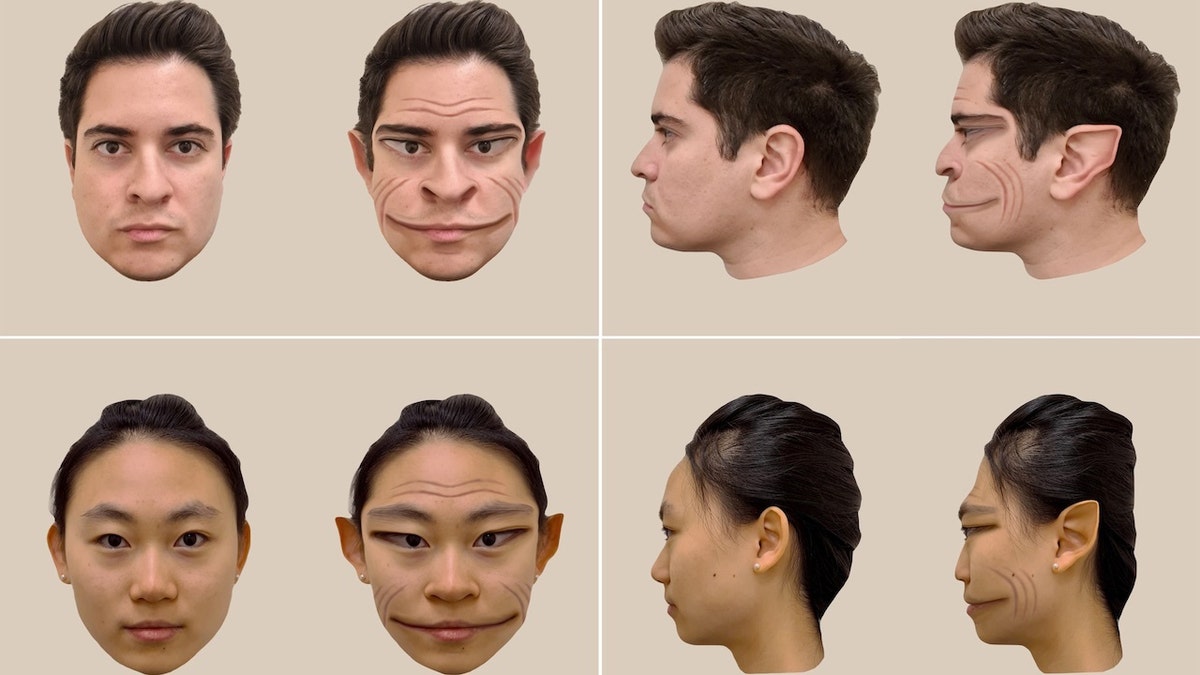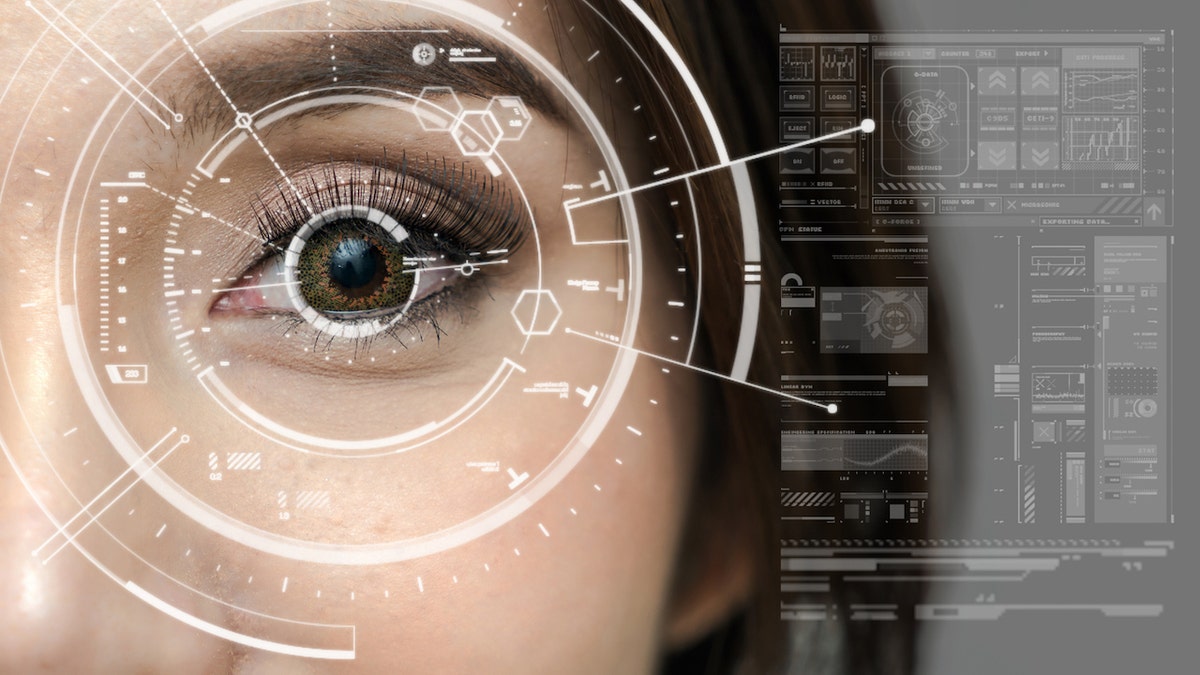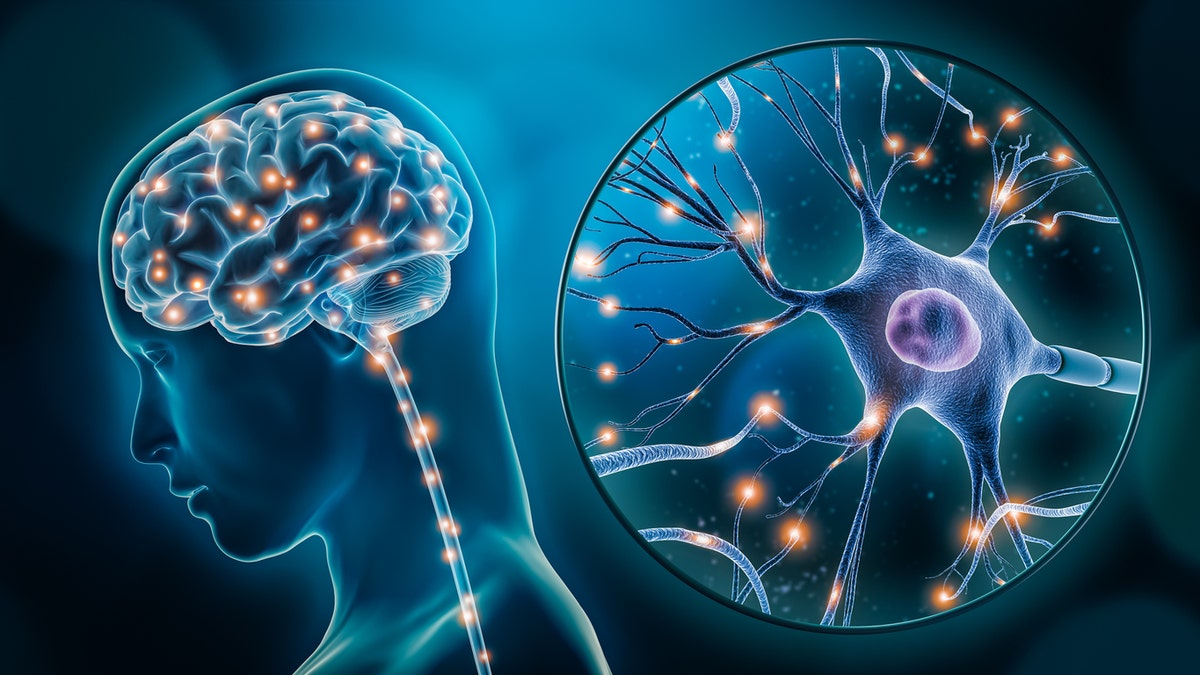Fox News Flash top headlines for March 25
Fox News Flash top headlines are here. Check out what's clicking on Foxnews.com.
It sounds like the stuff of horror films — but for people who are afflicted with a rare disorder, it’s a terrifying reality.
A condition called prosopometamorphopsia (PMO) causes facial features to appear distorted, according to researchers from Dartmouth College in Hanover, New Hampshire.
A study published in The Lancet revealed that a 58-year-old man reported seeing faces as distorted or "demonic" for 2½ years.
"The patient stated that the distortions — severely stretched features of the face, with deep grooves on the forehead, cheeks and chin — were present on every person's face he encountered, but he reported no distortions when looking at objects, such as houses or cars," the researchers wrote in the findings.
The patient did not see those same distortions when looking at two-dimensional faces on printed paper or digital screens.

Computer-generated images of the distortions of a male face, top, and female face, bottom, as perceived by a 58-year-old patient in a new study. (A. Mello et al.)
Still, despite the distortions, the patient reported that he was able to recognize people.
After the researchers showed the man some images on a screen of a person, they then had him compare the images with that same person’s actual face.
The patient provided feedback on the differences he perceived between the two — and the researchers used computer software to edit the photograph to capture what he was seeing.
"Through the process, we were able to visualize the patient’s real-time perception of the face distortions," said Antonio Mello, a PhD student in psychological and brain sciences at Dartmouth who worked on the study, in a press release.

"This suggests that the brain's way of visually ‘displaying’ faces, and the brain's ability to recognize a person's face, might be occurring in two different parts of the brain," said a neurologist about the study's findings. (iStock)
Dr. Jonathan Tiu, a neurologist and assistant professor of neurology at Hackensack Meridian School of medicine in New Jersey, was not involved in the study but reviewed the findings.
"Fascinatingly, the patient highlighted in the recent Lancet case report was still able to recognize everyone he was looking at," Tiu told Fox News Digital.
WALKING DEAD SYNDROME AND OTHER RARE CONDITIONS BAFFLE DOCTORS AND RESEARCHERS
"This suggests that the brain's way of visually ‘displaying’ faces, and the brain's ability to recognize a person's face, might be occurring in two different parts of the brain."
What to know about PMO
The name of the disorder, prosopometamorphopsia, comes from "prosopo" (the Greek word for face, prosopon) and "metamorphopsia," which refers to perceptual distortions.
Tiu described PMO as a "very rare visual disorder" that causes a person to see visual distortions of facial features.
Experts don't fully understand how PMO occurs and who is more likely to experience it.
"This can include a twisting or stretching of someone's eyes or a visual ballooning of that person's chin, or they might even see features where they shouldn't be, like seeing that person's teeth hover over their lips," he said.
BOOST BRAIN HEALTH AND SLOW MENTAL AGING WITH 10 INTRIGUING TIPS FROM LONGEVITY EXPERTS
Experts don't fully understand how PMO occurs and who is more likely to experience it.
"It is thought that an injury to specific parts of facial processing networks in the brain, whether it be from a stroke or tumor, can produce the symptoms of PMO," Tiu said.

Among those who are diagnosed with PMO, it is common for them to have been misdiagnosed at some point, researchers said in the study findings. (iStock)
The condition has also been known to occur as an effect of migraines or seizures, but sometimes it comes on without any identifiable cause.
PMO is very rare, with fewer than 100 documented cases, according to the neurologist.
There are different types of PMO, as noted in a separate article published by senior author Brad Duchaine, a professor of psychological and brain sciences at Dartmouth.
"It’s a problem that people often don’t understand."
The two most common types are full-face prosopometamorphopsia (full-face PMO) and hemi-prosopometamorphopsia (hemi-PMO), he noted.
Most cases last only a few days or weeks.
Some patients, however, continue seeing the distortions for years.
RESEARCHERS FIND SOURCES OF FOUR BRAIN DISORDERS, WHICH COULD LEAD TO NEW TREATMENTS
Among the people who have had PMO, it is common for them to have been misdiagnosed at some point, the researchers stated in the study findings.
"We’ve heard from multiple people with PMO that they have been diagnosed by psychiatrists as having schizophrenia and put on anti-psychotics, when their condition is a problem with the visual system," Duchaine said in the release.

In one study from 2021 that reviewed 81 individuals with PMO, the authors found that there was full or virtually full recovery in more than half of the reported cases. (iStock)
"And it’s not uncommon for people who have PMO to not tell others about their problem with face perception because they fear others will think the distortions are a sign of a psychiatric disorder," he added.
CLICK HERE TO SIGN UP FOR OUR HEALTH NEWSLETTER
For those who have the condition, the optimal treatment should be tailored to the underlying cause of the symptom, Tiu noted.
In one study from 2021 that reviewed 81 individuals with PMO, the authors found that there was full or virtually full recovery in more than half of the reported cases, he pointed out.
"Of those who recovered, the PMO resolved quickly within days to weeks," Tiu said.
The facial processing networks that involve PMO may be in a part of the brain that has generally good potential for recovery.
"However, some patients took years to recover, and in a group of patients, the symptoms did not demonstrate any improvement."
The study authors concluded that the facial processing networks that involve PMO may be in a part of the brain that has generally good potential for recovery, Tiu added.
CLICK HERE TO GET THE FOX NEWS APP
The Dartmouth researchers expressed hope that this latest study will help raise awareness of the rare but impactful condition.
As Duchaine added, "It’s a problem that people often don’t understand."
Fox News Digital contacted the researchers for additional comment.











































